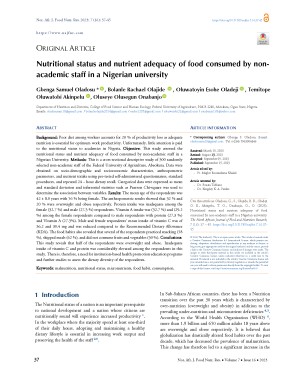Main Article Content
Nutritional status and nutrient adequacy of food consumed by non-academic staff in a Nigerian university
Abstract
Background: Poor diet among workers accounts for 20 % of productivity loss as adequate nutrition is essential for optimum work productivity. Unfortunately, little attention is paid to the nutritional status to academics in Nigeria. Objective: This study assessed the nutritional status and nutrient adequacy of food consumed by non-academic staff in a Nigerian University. Methods: This is a cross-sectional descriptive study of 300 randomly selected non-academic staff of the Federal University of Agriculture, Abeokuta. Data were obtained on socio-demographic and socioeconomic characteristics, anthropometric parameters, and nutrient intake using pre-tested self-administered questionnaires, standard procedures, and repeated 24 – hour dietary recall. Categorical data were expressed as mean and standard deviation and inferential statistics such as Pearson Chi-square was used to determine the association between variables. Results: The mean age of the respondents was 42 ± 8.0 years with 56 % being female. The anthropometric results showed that 32 % and 20 % were overweight and obese respectively. Protein intake was inadequate among the female (32.7 %) and male (27.3 %) respondents. Vitamin A intake was (32.7 %) and (29.2 %) among the female respondents compared to male respondents with protein (27.3 %) and Vitamin A (27.3%). Male and female respondents’ mean intake of vitamin C was of 36.2 and 39.4 mg and was reduced compared to the Recommended Dietary Allowance (RDA). The food habits also revealed that several of the respondents practiced snacking (58 %), skipped meals (62 %), and did not consume fruits and vegetables (30 %). Conclusions: This study reveals that half of the respondents were overweight and obese. Inadequate intake of vitamin C and protein was considerably elevated among the respondents in this study. There is, therefore, a need for institution-based health promotion education programs and further studies to assess the dietary diversity of the respondents.







